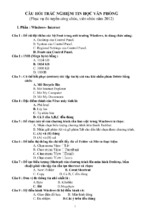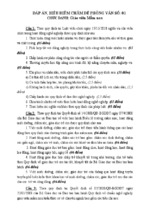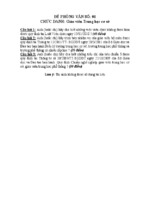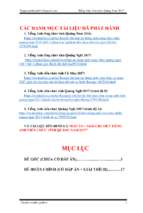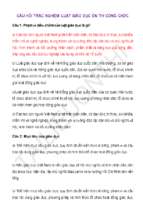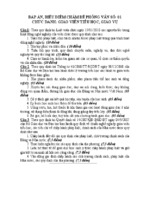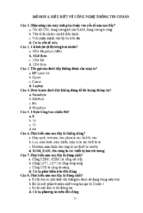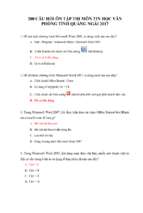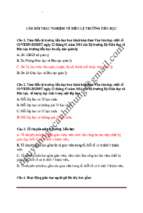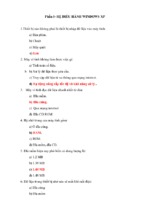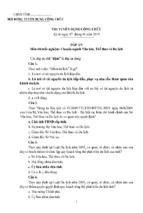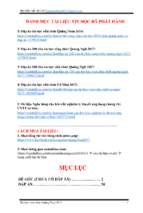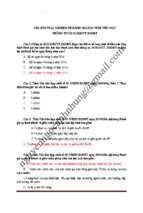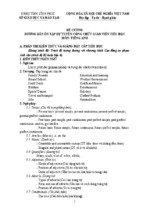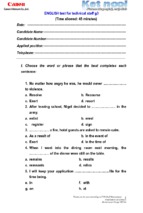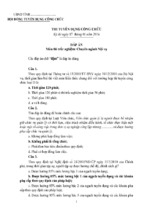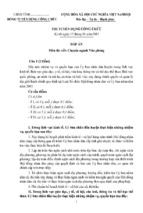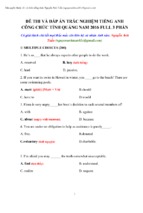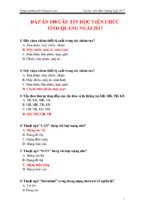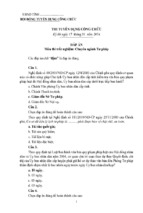TÀI LIỆU
ÔN THI MÔN TIẾNG ANH
NGẠCH: CHUYÊN VIÊN
I.
BỐ CỤC
A. PART 1: READING
1. Incomplete sentence
2. Text Completion
3. Reading Comprehension
B. PART 2: WRITING
1. Error Correction
2. Sentence Building
3. Sentence Transformation
4. Paragraph Writing
II.
HƯỚNG DẪN LÀM BÀI
A. READING
PART I: INCOMPLETE SENTENCES
Select the answer A, B, C or D which best complete the meaning of the sentence or explain
the meaning of the sentence. -> Thí sinh chọn phương án trả lời đúng nhất trong bốn phương
án.
1. The government wants to accelerate the ____________of Internet commerce
A. grow
B. grows
C. growing
D. growth
2. ____________tired, he decided to leave early.
A. Feels
B. To feel
C. Feeling
D. Felt
3. ____________ from a distance, the painting appeared quite realistic.
A. Seen
B. Saw
C. Seeing
D. See it
4. ____________you are not ready, let’s start later.
A. If
B. Unless
C. Because of
D. But
5. The employee can seek compensation from the employer for ________of contract.
A. breach
B. fulfillment
C. failure
D. bleach
6. There is much ________than expected
A. well
B. good
C. better
D. best
7. This jacket is ________superior to that one
A. far
B. few
C. a few
D. any
8. All of the students, John is the ________
A. tall
B. taller
C. tallest
D. most tall
1
9.
10.
11.
12.
13.
14.
15.
16.
17.
18.
19.
20.
Tom, ________has three sisters, has no interest in getting married.
A. who
B. whom
C. that
D. which
She put her prize in a place ________everyone would notice it.
A. where
B. which
C. in what
D. to what
Let’s not ________from the point at issue
A. avoid
B. digress
C. refuse
D. subtract
It’s ________cold.
A. terror
B. terrify
C. terrible
D. terribly
They have certainty studied ________to pass the test.
A. hard enough
B. hardly enough
C. enough hard
D. enough hardly
Is there ________about the project?
A. new anything
B. newly anything C. anything newly
D. anything new.
Would you like ________tea?
A. anything
B. some
C. little
D. few
He has two dogs: one is from England and ________is from Germany.
A. another
B. others
C. other
D. the other
The United States is waging a ________war overseas.
A. cost-free
B. costless
C. costly
D. money
There is no ________evidence that power lines area health risk.
A. final
B. conclusive
C. last
D. finishing
________he was cooking, his wife was working in the yard.
A. But
B. And
C. Yet
D. While
________the bad weather, I was forced to reschedule the business meeting in Thailand?
A. Regarding
B. From
C. Because
D. Because of
Part II: TEXT COMPLETION
Read the following text carefully and Select the best answer to complete the text. -> Thí sinh
chọn phương án trả lời đúng nhất trong bốn phương án để hòan thành đoạn văn được cho.
Passage 1
New dogs beginning training are called “Green dogs”. Most of them are German shepherds
because shepherds are the ____(1)____ for this work. Until they are fourteen months old, they
spend their time in good homes where they learn to be obedient. Then they begin their formal
training. For three months the new dogs learn ___(2)_____commands, to go forward, to hold
back, etc. After they learn to obey, the dogs are ____(3)____to be “intelligently disobedient”.
Suppose a dog’s master commands him to go forward but the dog sees a hole directly in front of
2
him, or an opening ___(4)____ small for him to go through, or an object his master may bump
into. Then the dog must be intelligent and disobey. If he cannot use his judgment, he will never
be able to take his master ___(5)___all kinds of traffic.
1. A. good
B. well
C. better
D. best
2. A. takes
B. to take
C. taking
D. took
3. A. teach
B. taught
C. teaching
D. teacher.
4. A. so
B. very
C. much
D. too
5. A. into
B. to
C. at
D. in
Passage 2
I plan to buy a computer. I took a computer class last month, and I want to use my computer
____(1)____ to do a lot of new things. First of all, I am going to email my grandchildren. They
will like that. Second, I’m very___(2)_____at home. I’d like to be more ____(3)____. A
computer can help with that, no more paper. Finally, I want to use the internet. It’s a good way to
___(4)____ the news. With the internet, I’m not going to need a newspaper. I think ___(5)___ a
computer at home is a fantastic idea.
1. A. good
B. usage
C. know
D. skills
2. A. messy
B. busy
C. free
D. alone
3. A. organized
B. careful
C. cleaned
D. tidied
4. A. ask
B. read
C. get
D. say
5. A. have
B. having
C. to have
D. has
Passage 3
One advantage of living outside London is that houses are cheaper. In the country you
can____(1)____ from the noise and hurry of the town. Although you have to get up earlier and
spend more time in trains or buses, you can___(2)_____better at night, and during weekends and
in summer evenings you can enjoy the fresh, clean air of the country. If you like ____(3)____,
you can spend your free time digging, planting, watering and doing the hundred and one other
___(4)____ which are needed in garden. Then, when the ___(5)___and vegetables come up, you
have the reward of one who has shared the secret of Nature.
1. A. live
B. stay
C. be
D. rest
2. A. stay
B. sleep
C. wake
D. play
3. A. field
B. gardens
C. pool
D. yards
4. A. jobs
B. plays
C. singing
D. camping
5. A. trees
B. plants
C. fruits
D. leaves
Part III
3
Read the passage below carefully and choose the best answer (A, B, C or D) for each
question. -> Thí sinh dựa vào đọan văn được cung cấp để chọn phương án trả lời đúng nhất trong
bốn phương án để trả lời các câu hỏi đã cho.
Passage 1
In Britain wedding invitations go out about six weeks before the wedding day. The guests
reply as soon as possible to say if they can or cannot come. Choosing a present for the couple can
be difficult. People don’t take their presents for the wedding. They send them to the woman’s
house before the wedding day. Most weddings take place before lunch or in the early afternoon.
Many people like to get married in church. The bride often wears a long white dress. Guests wear
their best clothes and most of the women wear hats. In the church, the bride’s family sits on the
left and the groom’s family sits on the right. Married people wear their wedding rings on the third
finger of the left hand. Most married women wear wedding rings, but married men often do not.
1. If you receive a wedding invitation, you ought to give ___________
A. no reply
B. a polite reply
C. a formal reply D. an immediate reply
2. People usually send their presents___________
A. to the woman’s house
B. to the groom’s house
C. to the church
D. to the house of match maker
3. “Bride” refers to ___________
A. a man who is on his wedding day.
B. a woman on her wedding day.
C. a woman who is engaged to a man.
D. a man who is engaged to a woman.
4. Many people like to hold their wedding ceremony___________
A. at home
B. in a hotel
C. outdoors
D. in church
5. According to the passage, which of the following is NOT TRUE
A. The couple could send out their invitations weeks before they get married.
B. People who accept the invitations have to send presents to the couple.
C. Woman without a ring on the third finger of her right hand must not have been married
D. It is difficult to choose the present for the couple.
Passage 2
4
I was in a strange city I didn’t know at all, and what’s more, I could not speak a word of the
language. On my second day I got on the first bus that passed, rode on it for several stop, then got
off and walked on. The first two hours passed pleasantly enough, then I decided I had to turn
back to my hotel for lunch. After walking about some time, I decided I had better ask the way.
The trouble was that the only word I knew of the language was the name of the street in which I
lived, and even that I pronounced badly. I stopped to ask a newspaper seller. He handed me a
paper. I shook my hands. I had to give him some money and went on my way. The next person I
asked was a policeman. He listened to me carefully, nodded and gently took me by the arm.
There was a strange look in his eyes as he pointed left and right and left again. I nodded politely
and began walking in the direction he pointed.
About an hour passed and I noticed that the houses were getting fewer and fewer and green
fields were appearing on either side of me. I had come all the way into the countryside. The only
thing left for me to do was find the nearest railway station.
1. The write prefer to walk back to his hotel because ________
A. he had no money to buy a ticket.
B. he wanted to lose himself in the city.
C. he tried to know the city in his way.
D. it was late and there were no buses passing by.
2. The newspaper seller ________
A. didn’t know where the hotel was.
B. didn’t understand what the writer said.
C. could understand what the writer said.
D. didn’t want to take money from the writer
3. From the story we know that the policeman ________
A. was kind but didn’t understand the writer.
B. told the writer where to take a train.
C. knew what the writer really mean.
D. was cold-hearted and didn’t help the writer.
4. What can we learn from the last paragraph?
A. The writer got close to the hotel where he stayed.
B. The writer got to the hotel with the policeman’s help.
C. The writer found he was much farther away from the hotel.
D. The writer found the hotel in the direction the policeman pointed.
5. In your opinion, what was the writer’s real trouble?
A. He didn’t know the city at all.
B. He couldn’t speak the language.
5
C. He went too far in the wrong bus.
D. He followed the policeman’s direction.
Passage 3
In the U.S.A, men and women choose their spouses. They do this by dating. When they
decide on a spouse, they get engaged. They do not need their parents’ consent. The man usually
gives the woman an engagement ring. Before a wedding, the bride’s women friends and relatives
usually have a party for her. It is called a shower. At the shower, everyone gives the pride a
present for her future home. The groom’s men friends give him a party. It is called a bachelor
party. The purpose of this party is to give the groom one last good time as a single man.
Sometimes young people pay for their own wedding. This is especially true if they have been
working for a while. In other cases, the family of the pride pay for most of the wedding and the
reception afterward.
1. In the U.S.A, men and women________.
A. don’t have to pay attention to the law when they get married
B. must have their parents’ permission if they are supposed to get married
C. must win their friends’ agreement if they are supposed to get married
D. could have their own choice in the matter of marriage.
2. At the bachelor party the groom________
A. could have one last good time as a bachelor
B. must promise to behave properly at the wedding
C. must prove him to be a good future husband
D. could have one last chance of freedom.
3. According to the passage, young people________
A. can ask for parental help to pay for their wedding.
B. can borrow from their friends to pay for the wedding.
C. at times pay for their wedding
D. completed rely on their family for their wedding.
4. The word “consent” in line 3 is closest in meaning to________
A. order
B. agreement
C. request
D. remarks
5. The word “present” in line 6 is closet in meaning to________
A. gift
B. kiss
6
C. ring
D. chance
WRITING
Part I: ERROR IDENTIFICATION
Choose the underlined part (A, B, C or D) that needs correcting -> Trong phần này, mỗi câu có 1
chỗ sai. Thí sinh chọn phương án tương ứng với chỗ sai đó.
1. Although he is tired but he still went out for work.
A
B
C
D
2. I would like buying some earrings like you.
A
B
C
D
3. They are not looking forward to go back to school next month.
A
B
C
D
4. The price of coffee is low last month but it is going to go up this month.
A
B
C
D
5. Don’t forget setting your alarm clock for 6.00, will you?
A
B
C
D
6. He could not decide whether to get a job or studying.
A
B
C
D
7. He was hungry, so he suggested to have dinner early
A
B
C
D
8. The weather was so nice, so I decided going for a walk
A
B
C
D
9. I’m sure he is capable in running a mile in four minutes.
A
B
C
D
10. A good friendship should be basing on mutual understanding.
A
B C
D
Part II: SENTENCE BUILDING
Choose the option (A, B, C or D) corresponding the best sentence that is made up from
the sets of words and phrases given. -> Trong phần này, thí sinh chọn A, B, C, hoặc D để
hòan thành câu dựa vào các từ đã cho.
1. It/ very kind/ you/ help me/ start/ engine.
A. It is very kind of you to help me start the engine.
B. It is very kind to you to help me start the engine.
C. It is very kind that you help me to start the engine.
D. It is very kind because you to help me start the engine.
2. They/ invite/ stay/ Florida
7
A. They invited me to stay with them in Florida.
B. They invited me staying with them in Florida.
C. They invited me stay with them in Florida.
D. They invited to stay with them in Florida.
3. while/ I/ open/ letter/ telephone/ rang.
A. While I opened the letter, the telephone rang.
B. While I was opening the letter, the telephone rang.
C. While I was opening the letter, the telephone was ringing.
D. While I had opened the letter, the telephone rang.
4. Tim/ be hungry/ not eat/ all day.
A. Tim was hungry because he hadn’t eaten all day.
B. Tim was hungry because he didn’t eat all day.
C. Tim was hungry because of not eating all day.
D. Tim was hungry because of his not eating all day.
5. Let/ play/ basketball/ instead/ swim.
A. Let’s to play basketball instead of swimming.
B. Let’s play basketball instead to go swimming.
C. Let’s play basketball instead of swimming.
D. Let’s play basketball instead of playing swimming.
6. John/offer/ carry/ bag/ Mary.
A. John offered carrying the bag for Mary.
B. John offered to carry the bag for Mary.
C. John offered to carry the bag of Mary.
D. John offered that he carry the bag for Mary.
7. have / nothing else / do / we / decide / go/ walk.
A. Having nothing else to do, we decided to go for a walk.
B. To have nothing else to do, we decided to go for a walk.
C. Having nothing else doing, we decided to go for a walk
D. Not having nothing else to do, we decided to go for a walk
8. she/ spend/ entire life/ care/ other people.
A. She spends her entire life caring for other people.
B. She spends her entire life on caring for other people.
C. She spends her entire life to care for other people.
D. She spends her entire life of caring for other people
9. there / something/ I / like/ ask / you.
8
A. There has something I’d like to ask you.
B. There’s something I’d like to ask you.
C. There’re something I’d like to ask you.
D. There’s something I’d like to ask for you about.
10. what/ you/ do/ if/ you/ have/ wings?
A. What will you do if you have wings?
B. What would you do if you had wings?
C. What would you do if you have wings?
D. What will you do if you had wings?
Part III: SENTENCE TRANSFORMATION
Choose the sentence (A, B, C or D) which has the same meaning as the given one. ->
Trong phần này, thí sinh thí sinh chọn A, B, C, hoặc D để tìm câu đồng nghĩa với câu đã cho
nhưng dùng khác cấu trúc câu.
1. My lawyer said I shouldn’t say anything to the police.
A. My lawyer told me not to say anything to the police.
B. My lawyer didn’t allow me to say anything to the police.
C. My lawyer didn’t let me say anything to the police.
D. My lawyer advised me not to say anything to the police.
2. We haven’t got any news that we can tell you.
A. We’ve got any news, but we can’t tell you.
B. We haven’t got any news to tell you.
C. We haven’t got any news for telling you.
D. We can’t tell you the news we’ve got.
3. I would prefer you not to smoke in here.
A. I’d rather you didn’t smoke in here.
B. I’d rather you couldn’t smoke in here.
C. I’d rather you don’t smoke in here.
D. I’d rather you wouldn’t smoke in here.
4. “Don’t forget to post the letter,” she told him.
A. She reminded him forget to post the letter.
B. She reminded him to post the letter.
C. She reminded him to forget not to post the letter.
D. She reminded him about posting the letter.
5. We couldn’t drive because of fog.
A. The fog prevented us not to drive.
9
B. The fog prevented us from driving.
C. The fog prevented us against driving.
D. The fog prevented us about driving.
6. Does parking here cost anything?
A. Don’t I have to pay anything for parking?
B Is parking here costly?
C. Do I need to pay for parking?
D. Does it cost much to park here?
7. “Could you lend me your pen?” Tom said to Jerry
A. Tom asked Jerry to lend him her pen.
B. Tom asked to lend Jerry’s pen.
C. Tom asked if Jerry could lend her pen
D. Tom asked if Jerry could lend her his pen.
8. “Right. I’ll take the brown pair.”
A. Andrew promised to take the brown pair.
B. Andrew wanted to take the brown pair.
C. Andrew agreed to take the brown pair.
D. Andrew asked to take the brown pair.
9. Would you mind waiting for a moment?
A. It’s not worth waiting for a moment, is it?
B. Could you please waiting for a moment?
C. Wait for a moment, please.
D. I couldn’t help waiting for a moment
10. I haven’t seen him for five years.
A. I last saw him five years ago.
B. It’s five years for I saw him.
C. It’s five years ago that I last saw him
D. It’s five years since I have seen him.
Part IV
Paragraph Writing. -> Phần này thí sinh được yêu cầu viết một bài viết dài khỏang 120 từ về
chủ đề được cho.
TASK 1:
Write a paragraph about 120 words on the topic: “your favorite person”.
You should write:
Who your favorite person is
What the person is like
10
What the person looks like
Why you like him/ her
TASK 2
Write a paragraph about 120 words on the topic: “Your last vacation”.
You should write:
Where you were last vacation
What you did last vacation
With whom you spent your last vacation
What you like most doing last vacation
TASK 3
Write a paragraph about 120 words on the topic: “Your favorite place”.
You should write:
What the place is
What it is like
What you can see there
What you can do there
Why you like the place
TASK 4
Write a paragraph about 120 words on the topic: “Your dream home”.
You should write:
What type of house you like to live in.
Where your house is
What there are in front of your house, behind your house.
What there are in the living room/ bedroom/ kitchen and bathroom.
TASK 5
Write a paragraph about 120 words on the topic: “Your shopping”.
You should write:
Where you like to shop
How often you go shopping
With whom you go
What you usually buy
Why you like shopping
TASK 6
Write a paragraph about 120 words on the topic “The advantages and disadvantages
of the Internet”
11
You should write:
Advantages: Internet is an effective tool to search information, study and relax...
Disadvantages: The information is not reliable. Improper contents are available on the Internet
such as violent movies, online games, etc.
12
III.
TÓM TẮT NHỮNG ĐIỂM NGỮ PHÁP CẦN LƯU Ý
1. Auxiliary Verbs (Trợ động từ):
+ Công thức chung: Aux Verb + Main Verb
1.1. Modal Verb:
a. Công thức: Subject + Modal Verb + bare Inf
b. Các Modal Verbs:
+ will/shall/would
+ can/could
+ may/might
+ should/ought to/had better
+ must
c. Cách dùng.
1.2. Be:
a. Công thức: Be + V_ing / past participle (V3)
b. Hình thức chia:
– Present: am/is/are
– Simple Past: was/were
– Past participle: been
– Future: will be
c. Cách dùng:
– be + V_ing: các thì tiếp diễn
– be + past participle (V3): thể bị động
1.3. Have:
a. Công thức: Have + past participle
b. Hình thức chia:
– Present: have/has
– Past: had
c. Cách dùng: dùng trong các thì hoàn thành.
1.4. Do:
a. Công thức: do + bare Inf
b. Hình thức chia:
– Present: do/does
– Past: did
c. Cách dùng:
– Câu hỏi Yes/No.
– Câu phủ định.
13
– Câu nhấn mạnh (emphatic “do”).
– Câu hỏi đuôi (tag question).
1.5. Others:
– be going to + bare Inf
– used to + bare Inf
– have to + bare Inf
– be/get used to + V_ing (phân biệt sự khác nhau giữa “be” và “get”)
– should have + past participle
– could have + past participle
– must have + past participle
2. Tenses (Thì):
2.1. Present:
2.1.1. Simple Present:
a. Công thức.
b. Cách dùng:
– Fact.
– Habit.
– Routine.
– Schedule, timetable.
c. Trạng từ đi kèm:
+ always, usually, often, every day/month/year, every time, seldom, never, sometimes,
from time to time, once in a while, etc.
2.1.2. Present Continuous:
a. Công thức: S + am/is/are + V_ing
b. Cách dùng:
– Something happening at the time of speaking. (Ex: I’m eating now)
– Something happening around now. (Ex: I’m studying at Da Nang University)
– An arranged plan (kế hoạch đã được sắp xếp từ trước sẽ thực hiện trong tương lai
gần). (Ex: I’m going to Hanoi tomorrow)
– always + V_ing: việc gì đó xảy ra nhiều hơn mức có thể chấp nhận được -> có ý
phàn nàn. (Ex: He’s always getting up late)
c. Trạng từ, định ngữ đi kèm:
+ now, at the moment, for the time being, at present, currently, etc.
2.1.3. Present Perfect:
a. Công thức: S + have/has + past participle
b. Cách dùng:
14
– Chỉ sự việc đã hoàn thành trước thời điểm hiện tại. (Ex: I have eaten dinner already)
– Chỉ sự việc kéo dài trong một khoảng thời gian từ quá khứ cho đến hiện tại. (Ex: I
have worked here for 2 years)
c. Trạng từ đi kèm:
+ just, already, yet, so far, never, always, up to now/present, etc.
2.1.4. Present Perfect Continuous:
a. Công thức: S + have/has been + V_ing
b. Cách dùng:
– Chỉ sử việc vừa mới xảy ra và để lại hậu quả ở hiện tại. (Ex: They are sweating, and
their clothes are dirty. They’ve been playing football)
– Chỉ sự việc kéo dài trong một khoảng thời gian từ quá khứ cho đến hiện tại, nhấn
mạnh tính liên tục của hành động. (Ex: I’ve been studying English for 7 years)
c. Từ đi kèm:
+ since, for, so far, until now
2.2. Past:
2.2.1. Simple Past:
a. Công thức: S + Verb (past form)
b. Cách dùng:
– Chỉ sự việc đã xảy ra trong quá khứ (completed time in the past). (Ex: I went to the
movies yesterday)
c. Định ngữ đi kèm:
+ yesterday, n days/weeks/months/years AGO, last week/month/year, etc.
2.2.2. Past Continuous:
a. Công thức: S + was/were + V_ing
b. Cách dùng:
– Hành động đang xảy ra tại một thời điểm xác định trong quá khứ. (Ex: I was driving
home at 7PM yesterday)
– Thường dùng trong câu diễn tả 1 hành động đang xảy ra (past continuous) và có 1
hành động chen ngang (simple past). (Ex: She was taking a bath when the phone rang).
– Dùng để diễn tả hai hành động xảy ra đồng thời trong quá khứ. (Ex: My dad was
reading a newspaper while my mom was making dinner)
c. Định ngữ đi kèm:
+ at (time) yesterday, this time last week/month/year, while, etc.
2.2.3. Past Perfect:
a. Công thức: S + had + past participle
b. Cách dùng:
15
– Hình thức quá khứ của Present Perfect. (Ex: When he came, we had finished our
dinner)
– Diễn tả hành động xảy ra trước một hành động làm mốc trong quá khứ. (Ex:
Yesterday, he had done his homework before he went out with his friends)
– Chỉ sự việc kéo dài trong một khoảng thời gian tính đến 1 thời điểm mốc trong quá
khứ. (Ex: By last month, he’d worked at that company for 3 years)
c. Từ nhận diện đi kèm:
+ for, since, by
+ Thường xuất hiện trong câu có “before, after” ở quá khứ.
2.2.4. Past Perfect Continuous:
a. Công thức: S + had been + V_ing
b. Cách dùng:
– Hình thức quá khứ của Present Perfect Continuous.
– Diễn tả một hành động đã xảy ra và để lại hậu quả trong quá khứ. (Ex: They were
sweating, and their clothes were dirty. They’d been playing football)
– Chỉ sự việc kéo dài trong một khoảng thời gian tính đến 1 thời điểm mốc trong quá
khứ, nhấn mạnh tính liên tục của hành động. (Ex: By last month, he’d been working at
that company for 3 years)
2.3. Future:
2.3.1. Simple Future:
a. Công thức: S + will + bare Inf
b. Cách dùng:
– Quyết định nhất thời (đưa ra tại thời điểm nói). (Ex: Your bags look heavy. I’ll help
you carry them)
– Dự đoán tương lai. (Ex: I think she’ll like the present we bought for her)
* Chú ý phân biệt giữa các cách diễn đạt tương lai:
+ be going to
+ be + V_ing
+ will
+ will be + V_ing
2.3.2. Future Continuous:
a. Công thức: S + will be + V_ing
b. Cách dùng:
– Hành động đang xảy ra tại một thời điểm trong tương lai. (Ex: I’ll be watching an
important football match on TV at 8PM tomorrow night)
– Một kế hoạch đã được sắp xếp trước (tương tự với “be + V_ing”). (Ex: I’ll be
16
meeting Ann tomorrow)
c. Định ngữ đi kèm:
at (time) tomorrow, this time next week/month/year, etc.
2.3.3. Future Perfect & Future Perfect Continuous:
a. Công thức: S + will be + V_ing
b. Cách dùng:
– Hành động sẽ được hoàn thành trước một thời điểm trong tương tai. (Ex: I’ll have
finished my report by 8AM tomorrow)
– Hành động đã diễn ra được một thời gian tính đến một thời điểm trong tương lai.
(Ex: By the end of this month, I’ll have worked/have been working for this company
for 5 years).
c. Định ngữ đi kèm:
+ by + point of time
3. Phrase & Clauses (Các loại mệnh đề):
3.1. Điều kiện (If):
– Loại 1 (If + S + simple present; S + will + Vo)
– Loại 2 (If + S + past subjunctive; S + would +Vo)
– Loại 3 (If + S+ had +P.P; S + would + have +P.P)
– Đảo ngữ trong mệnh đề điều kiện (should, were, had)
– Unless (If… not…)
– Các từ/cụm từ chỉ điều kiện khác: provided that, on condition that, as long as, so
long as, suppose, supposing, in case, even if, etc.
3.2. Wish, If only (Mệnh đề với Wish/If only):
– S + wish + Clause (simple past / past subjunctive) (ao ước hiện tại)
– S + wish + Clause (past perfect / past perfect subjunctive) (ao ước ở quá khứ)
– If only + Clause (simple past / past subjunctive) (ao ước hiện tại)
– If only + Clause (past perfect / past perfect subjunctive) (ao ước ở quá khứ)
3.3. Purpose (Mục đích):
a. Phrases:
– to Inf
– in order to Inf
– in order for s.o to Inf
– so as (not) to Inf
b. Clauses:
– so that + Clause
– in order that + Clause
17
3.4. Result (Kết quả):
a. Phrases:
– too… to Inf
– enough + (for + Object) + to Inf
b. Clauses:
– so… that + Clause
– such + (a/an) + Adj + Noun + that + Clause
3.5. Reason (Lý do):
a. Phrases:
– because of + Noun/V_ing
– owing to + N/V_ing
– due to + N/V_ing
b. Clauses:
– Because/Since/As + Clause
3.6. Concession (Nhượng bộ):
a. Phrases:
– in spite of + N/V_ing
– despite + N/V_ing
b. Clauses:
– Although + Clause
– Even though + Clause
– Though + Clause
– No matter + who/what/when/where/why/how + Adj/Adv + S + V (Ex: No matter
what you say, I always believe her)
– Whatever (+ Noun) + S + V (Ex: Whatever others may say, you’re certainly right)
3.7. As if/as though; It’s (about/high) time, Would rather:
– As if/as though + Clause (simple past/past perfect)
– It’s (about/high) time + Clause (simple past)
– Would rather (that) + Clause (simple past/past perfect)
– S + would rather (not) + bare Inf
3.8. Noun Clause (Mệnh đề danh từ): Mệnh đề phụ có chức năng của một danh từ.
– That/The fact that + Clause => Noun
– What/When/Where/Who/Which/Whether/How + S + V => Noun
3.9. Relative (Quan hệ):
– Mệnh đề quan hệ thay cho chủ ngữ (who, which)
– Mệnh đề quan hệ thay cho tân ngữ (whom, which)
18
– Mệnh đề quan hệ dùng “THAT”
– Mệnh đề quan hệ chỉ sở hữu (whose)
– Trạng từ quan hệ WHEN, WHERE, WHY
– Phân loại mệnh đề quan hệ: xác định vs không xác định
– Giới từ trong mệnh đề quan hệ (khi nào có thể đưa giới từ ra trước đại từ quan hệ,
khi nào không thể)
– Dạng rút gọn của mệnh đề quan hệ (4 dạng)
4. Passive (Bị động)
– be + past participle
5. Infinitives & Gerunds:
– Verb + to Inf
– Verb + Gerund
– Verb + Inf/Gerund (same meaning) (Ex: begin, start, continue)
– Verb + Inf/Gerund (different meanings) (Ex: remember, try, go on, regret)
– Expression + to Inf: It’s hard, It’s easy, It’s difficult, etc. (Ex: It’s hard to remember
everything)
– Expression + Gerund: It’s no use, it’s no good, there’s no point, it’s (not) worth, etc.
(Ex: There’s no point complaining all the time)
– To Inf làm chủ ngữ/bổ ngữ (Ex: To study hard is every student’s responsibility)
– Gerund làm chủ ngữ/bổ ngữ (Ex: My dream is traveling around the world)
6. Participles & Participle Clauses: (Thành lập Adjective từ Verb)
– Present participle: V_ing as Adj (Ex: interesting) -> nghĩa chủ động
– Past participle: V3 as Adj (Ex: interested) -> nghĩa bị động
* Chú ý giới từ đi cùng past participle (Ex: interested IN, surprised BY, impressed
WITH/BY, etc.)
- Present Participle Clause. (Ex: Feeling tired, he went to bed early)
– Past Participle Clause. (Ex: Beaten by the gangsters, he couldn’t move for a few days)
7. Diễn tả về số lượng:
– some/any
– most/most of
– many/a large number of/a great number of/a lot of/lots of + plural Noun
– much/a great deal of/a large amount of/plenty of/a lot of/lots of + Uncountable Noun
– a few/few + plural Noun
– a little/little + Uncountable Noun
8. Subject-Verb Agreement:
– either… or…
19
IV.
– neither… nor…
- not only… but also…
- with
– together with
– along with
– as well as
- and
– both… and…
9. Trật tự của tính từ:
– Number + Quality + Size + Age + Color + Origin + Material + Noun
Ex: a small black plastic bag.
TÀI LIỆU THAM KHẢO
1. English Grammar in Use, Raymond Murphy, New Edition
2. Practical English Usage, Michael Swan, New Updated
3. A practical English Grammar, A.J.Thomson & A.V.Martinet, Fourth Edition
4. Bài tập biến đổi câu
5. Các tài liệu luyện kỹ năng đọc; viết.
20
- Xem thêm -

